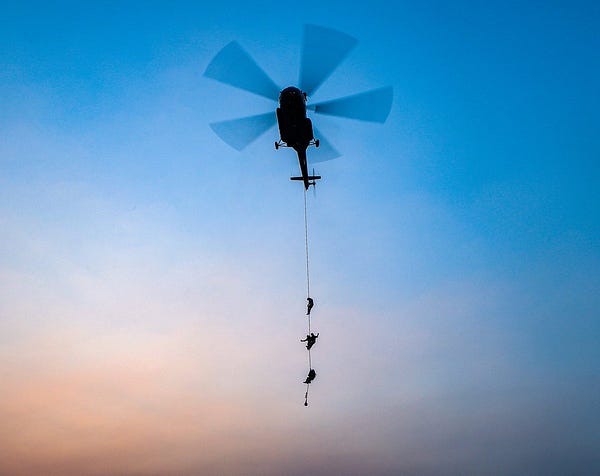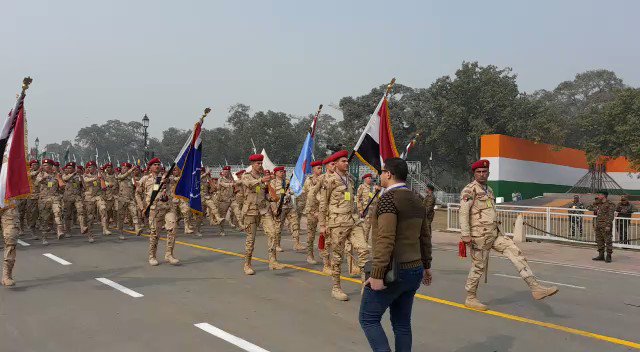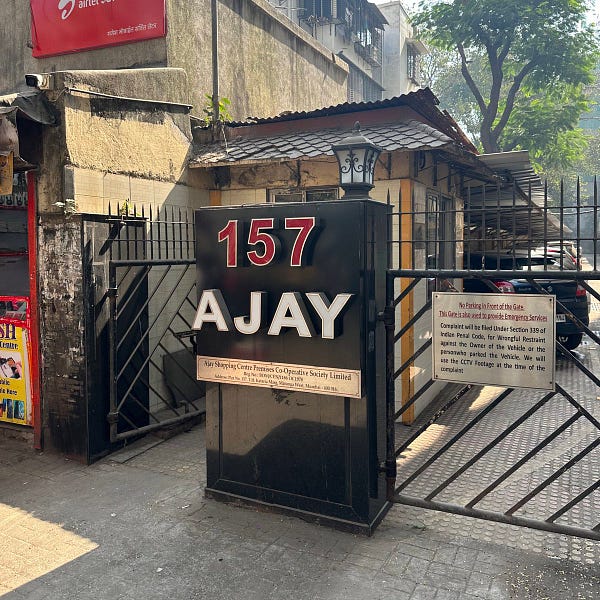What lies ahead for India-Egypt ties + 2023 plans for India Inside Out
Canal Plus: Sisi in Delhi
Happy 2023 (if you will allow me to send new year wishes nearly a month in) and Happy Republic Day to readers of India Inside Out.
The newsletter was on a brief hiatus over the holiday period, but will be much more regular over the course of this year – not least because our 1-year-old has just begun nursery, giving me suddenly diaper-free mornings that I can devote to reading and writing about India.
And what a year it promises to be for India watchers.
In addition to sitting in the economic and geopolitical sweet spot (which we wrote about late last year), 2023 also marks the year of India’s G20 presidency, with the summit slated for New Delhi in September. Given the global context – with Russia continuing to wage war on Ukraine, the West still attempting to decouple from China and a global recession on the cards – India has a huge opportunity to assert its position on the world stage. Whether it can do so, while also addressing its own many economic, foreign policy and defence challenges over the year will be of prime interest, given the international spotlight.
On this, see Shigesaburo Okumura for Nikkei and Raymond E Vickery, Jr in the Diplomat for a sense of how some international voices are speaking about the year ahead for India.
Turning to domestic politics, 2023 will feature at least nine state elections: the North-Eastern states of Tripura, Meghalaya and Nagaland in February; the big southern state of Karnataka – the BJP’s only Southern foothold so far – most likely in May; and the mixed bag of Mizoram, Telangana, Chhattisgarh, Madhya Pradesh and Rajasthan, over November and December, with the last three large ‘Hindi heartland’ states often being described as a ‘semi-final’ vote ahead of 2024. Plus, there have been hints that polls are also expected in the union territory of Jammu & Kashmir for the first time since Article 370 was struck down in 2019).
Looming large over all of these are the impending general elections, due in April-May 2024, when Prime Minister Narendra Modi is expected to seek a third five-year term, and will be hoping to lead the Bharatiya Janata Party to a third consecutive majority, including further expansion particularly into South India.
This and next year’s electioneering will take place against the backdrop of the Modi government’s continued pressure on independent institutions like the judiciary and repeated attempts to muzzle the press even as the Opposition parties struggle to reinvent themselves and work out a configuration that can take on the BJP’s national juggernaut.
In other words, no dearth of topics for us to tackle at India Inside Out. I’m broadly hoping to stick to two broad tracks over the course of this year:
Examining India’s key foreign relationships, whether friendly or adversarial, from multiple angles, particularly given the context of this G20 presidency year.
Delving into the policy issues and political strategies that will take centre-stage ahead of the 2024 general elections.
In addition to those, of course, I will continue sending you links to the most interesting writing on Indian politics, policy and foreign affairs, and continue interviewing scholars, experts and authors on all things India – particularly my pet obsessions on efforts to decolonise Indian history (see, most recently, the interview with historian Priya Satia) and accounts of India’s foreign policy past (c.f. Vineet Thakur on India’s First Diplomat).
As always, if you have suggestions of books to read or experts you would like to see interviewed on any of these subjects – India’s key foreign relationships, the run-up to 2024, decolonising Indian history and India’s foreign policy past – write to me at rohan.venkat@gmail.com.
I’m hoping to eventually set up an India Inside Out recommendation corner populated by suggestions from readers on the most interesting work on India, in addition to the links I’ll be curating regularly. So please do send in suggestions of books, podcasts, papers, videos – anything that you think is worth paying attention to.
I was originally going to tackle a couple of important topics – India’s much delayed census and other citizen-counting exercises, plus an executive vs judiciary face-off – that will be crucial to the country as it enters its 75th year of being a republic for this issue.
But given that I’m writing this from Cairo, I simply couldn’t avoid the fact that Egyptian President Abdel Fattah el-Sisi is this year’s Republic Day chief guest. So, here is a short note on India-Egypt ties and where they might be headed:
Egypt is in an odd place right now. The country’s economy was hit hard by the pandemic, then got a no-tourism-plus-high-food prices double-whammy as a result of the Russian war on Ukraine, since the two countries accounted for a large number of visitors and also a significant portion of the wheat Egypt imported annually. The Egyptian Pound lost almost half of its value against the US dollar over the last 12 months. Inflation is through the roof, and foreign reserves are precariously poised. The government had to ask the International Monetary Fund for another bailout, for the fourth time in a decade. One economist described the country as being “on the brink of a financial and economic abyss”.
Yet Egypt is not Lebanon. “What makes Egypt lucky is that external backers place more importance on the viability of the state, irrespective of how badly it's managed,” the Tahrir Institute for Middle East Policy’s Timothy Kaldas told DW. “I hate to say this, but from the perspective of key external backers, Lebanon's problems are much more manageable and containable, than if they were happening in a country with over 100 million people.”
As a result under Sisi, this economic fragility has not led to a downgrade in ambitions for Egypt’s strategic role in the region and beyond – as an influential African voice, the most populous Arab nation, the Arab country with the largest military, the custodian of the Suez Canal and a gateway to Mediterranean and European markets.
This combination presents an opportunity for India, which over the past decade has been working hard to take its partnerships with West Asian and Arab nations beyond pre-existing energy-and-remittance ties.
The history of the post-Independence Indo-Egyptian relationship is steeped in classic Non-Aligned Movement lore, with the well-known bonhomie between former Indian Prime Minister Jawahralal Nehru and former Egyptian President Gamal Abdel Nasser, as well as tales of Nasser being ‘saved’ from the front-lines of the 1956 Suez Canal Crisis by then Indian ambassador Ali Yaver Jung.
The years of former President Hosni Mubarak’s rule left much more to be desired on the Indo-Egyptian front with “diplomatic folklore” suggesting that “an apparently minor protocol gaffe over seating arrangements during the New Delhi NAM summit in 1983” playing something of a role in the frosty relations that followed.
All of that has been put well behind by both nations, with ties firming up over the last decade and a half – including during the short-lived government of former President Mohammed Morsi.
Under Sisi the relationship has continued to deepen, and the last few years in particular have seen much more activity: Bilateral trade jumped by 75% in 2021-22 over the previous year and the Egyptian president arrived in India this week just as special forces from the two nations’ militaries were carrying out their first-ever joint exercise in Rajasthan. An Egyptian contingent will also be marching in the Republic Day parade.





Major reconfigurations in the West Asian-North African sphere have opened up the potential for more cooperation between ‘middle powers’, particularly given the Abraham Accords – which saw the normalisation of ties between Israel and the United Arab Emirates as well as Bahrain – coupled with New Delhi’s growing connection to Tel Aviv.
This has led to the I2U2 minilateral, involving India, Israel, the United States and the UAE (as well as the India-France-UAE grouping) and given further impetus to New Delhi’s efforts to attract investment, build defence ties and deepen anti-terror cooperation with the leaders of West Asian states.

Mohamed Soliman, director of the Strategic Technologies and Cyber Security Program at the Middle East Institute in Washington, has argued that Egypt ought to add its voice to this ‘Indo-Abrahamic’ construct:
“Egypt is an active player in four strategic theatres: The Mediterranean Sea, the Red Sea, Africa, and West Asia, making Cairo a valuable partner for Delhi. Egypt is emerging as a Mediterranean power because of its centrality in gas geopolitics, and the Suez Canal guarantees Cairo’s status as a Red Sea power. In the Mediterranean space, Cairo could partner with Delhi and Paris in “addressing transnational challenges affecting the transoceanic space from the Mediterranean Sea to the Indo-Pacific.” In Africa, Egypt has a hybrid identity as a rising power with its own aspirations in Africa on the military and economic fronts as well as its position as a gateway to Africa. Egypt’s four-theatre advantage makes reviving the bilateral relationship a priority for Delhi as India attracts more partners and allies to pave the way to form a “third pole” in international politics.”
What could that mean concretely?
For one, Modi and Sisi have already agreed to elevate the bilateral relationship to that of a ‘strategic partnership’, which should at the very least lead to more regular meetings between the two sides to speed up all cooperative projects. (See Foreign Secretary Vinay Kwatra’s full briefing for more on this strategic partnership). India has also invited Egypt to be an observer nation at this September’s G20 summit.
Pre-2022, Egypt imported the bulk of its wheat from Ukraine and Russia. Over the least year, India sent 61,000 tons of wheat to Egypt, despite otherwise banning exports, and can hope to sell much more now that it is a certified wheat seller to the country – with fertiliser potentially being sent in the other direction.
On the business front, Indian companies might look to take advantage of the Suez Canal Economic Zone – with ReNew Power’s green hydrogen plant, featuring an investment of US$ 8 billion being the headliner. The IMF programme’s efforts to make the Egyptian economy more friendly to private industry might also attract more Indian firms, particularly given Egypt’s potential role as a gateway into North Africa and possibly even Europe.
Defence and security may prove to be the most immediate of the pillars of this strategic partnership. Much has been made of India offering to set up production and manufacturing lines for its light combat aircraft, Tejas, in Egypt – although there is some indication that Cairo may go a different direction for the moment – as well as selling missiles, radars and other defence equipment.
And aside from arms exports – and India even ‘co-manufacturing’ in Egypt as Sisi put it – further exercises between the two militaries, especially on the maritime front, and cooperation on anti-terror efforts are likely to be front-and-center, with Modi and Sisi highlighting the latter when speaking to the press after their meeting on January 25. Egypt has invited India to participate in its ‘Exercise Bright Star’ joint exercises with the US this September.
(On a more self-interested note for me, Sisi also mentioned a plan to ‘intensify’ flights between Egypt and India, up from the limited connections available at the moment).
The history of Egypt-India ties suggests that this relationship has plenty of potential, but also can easily drift without attention and focused effort. Though Cairo and New Delhi’s interests may converge on a number of issues, Egypt’s economic woes mean it will continue to court investment from the country that represents India’s biggest geopolitical challenge – China.
“China, as usual, has been the first to take advantage of the opportunities presented by SCZONE, seeing the canal as a vital part of its Belt and Road and Maritime Silk Road projects. Spread over an area of 7.3 sq km, it has built a vast industrial estate called Teda Suez, an entity jointly funded by the China Development Fund and the Tianjin Teda Investment Holding. In its 1.3 sq km Phase 1, it has already managed to attract 85 companies that have cumulatively invested over US$ 1 billion. Work on Phase 2 started in 2016 and has drawn significant investments into sectors like fibreglass and high-voltage transformers. Egypt’s prevailing economic vulnerability is bound to increase the clout that China enjoys over a pivotal country.”
New Delhi may not be able to match the scale of Chinese involvement in Egypt, given its investments in Sisi’s new capital, its interest in the canal and, now that zero-Covid is done, its potential to send large numbers of tourists. But Cairo has shown that, like New Delhi in the aftermath of the Russian invasion of Ukraine, it has no attention of being forced into any sort of camp and that it is willing invest time and effort into this relationship.
The question then, for the two countries is whether this promising momentum can be maintained – and whether Sisi can make these moves while attempting to navigate his nation away from the financial abyss.
Read also:
‘Why is Egyptian outreach important for India’s strategic calculations?’ by Manjari Singh.
El-Sisi’s visit to India represents a revival of Delhi-Cairo axis: Mohammed Soliman speaks to Sreemoy Talukdar.
Military cooperation with MENA Region: An Indo-Egyptian connection, by Alvite Ningthoujam.
Next time, links! Send in any recommendations, feedback or funny memes to rohan.venkat@gmail.com.







